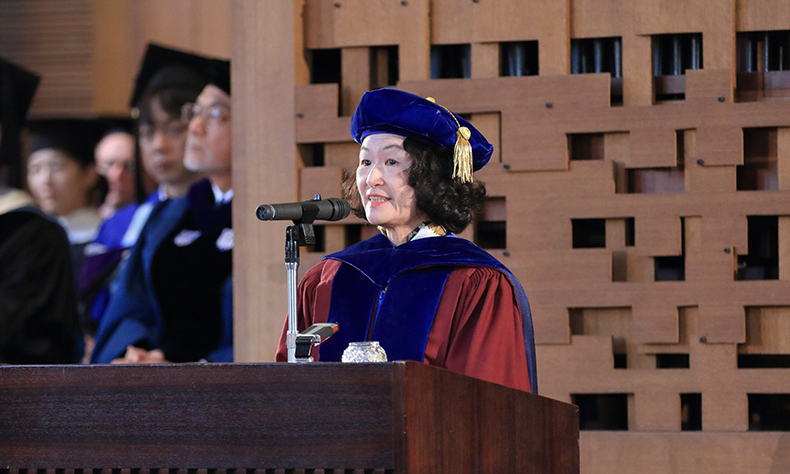NEWS
Commencement Address by Junko Hibiya, President
Update: March 24, 2017

Graduates of the College of Liberal Arts, master's and doctoral degree programs, congratulations! Permit me to offer my heartfelt greetings to the families, relatives and friends of the graduates, watching today's ceremony in the Diffendorfer Memorial Hall.
On December 17, 2016, to commemorate the 60th anniversary of Japan's entry into the United Nations, ICU held a series of sessions, called, "Action Dialogues for Achieving the Sustainable Development Goals." Some of today's graduates may have participated. The purpose of this event was to discuss how the world must change in order to achieve the Sustainable Development Goals (SDGs) adopted at the United Nations General Assembly of September 2015, as global targets to be realized by the year 2030. These dialogues addressed the United Nations Global Compact and university policies that can contribute to these efforts. The United Nations Global Compact (UNGC) is a worldwide approach intended to create a sustainable society, in which the signatory companies and organizations take responsibility for creative leadership (http://ungcjn.org/gc/index/html.)
The 17 SDGs include not only issues relevant to developing countries such as "No Poverty" and "Zero Hunger," but also those common to developing and developed countries such as "Climate Action." "Quality Education" is one of the latter issues. With the slogan of "Quality Education for All," this goal aims to ensure inclusive and quality education for all and to promote lifelong learning. It lists "global citizenship education" as one of the targets to be achieved by 2030 for high-quality education. In these Action Dialogues, I gave a talk session entitled "Education for Global Citizenship" with our alumnus Mr. Toshio Arima (class of 1967), a board member of the UNGC and the representative of Global Compact Network Japan.
Our dialogue covered various issues. I would like to share with you who are graduating from ICU today an episode Mr. Arima mentioned that has influenced him deeply. One day, Professor Tateo Kanda, professor of Western classics and New Testament studies, asked him what his dream was. How would you answer this question? His was to work overseas and live a comfortable life. "Well, that's rather stingy," Professor Kanda replied. This response made him begin to wonder about what a dream that wasn't stingy would be, and that brought him to where he is today. I asked him what Professor Kanda really had in mind. He said "I think he may have meant doing work that helps people."
With the deadline of 2030, the slogan of the SDGs is "Leaving no one behind." The efforts to achieve these goals have already begun in every corner of the world. The agenda calls for action by all countries, regions and people. Each individual must proactively join these efforts. A month after the Action Dialogues, I realized how my own participation matters when I attended the Diversity Advisory Board of the Japan Science and Technology Agency. This Board "aims to develop a new future by tackling diverse issues creatively with people that have diverse experience and ideas." (http://www.jst.go.jp/diversity/message/shitsutyo.html)Examining materials that have critically reviewed the 17 goals from the viewpoint of diversity, we discussed how we can embark upon a more ambitious agenda.
Today, you finish your days at ICU and leave here for a wider world. Being a graduate of this institution, no matter where you may be, please do lead your life as a good citizen and keep wondering about what a dream that isn't stingy would be, that is, what work helps people. Mr. Arima, who received his diploma half a century ago in this chapel, joined Fuji Xerox Co. Ltd., and 35 years later in 2002, became President and Representative Director. Reflecting on Professor Kanda's response, he said, "I hope that I am helping people a little by working to promote the achievement of the SDGs through the UN Global Compact."
In addition to the goals I have mentioned, the SDGs range from good health and well-being, energy, building resilient infrastructure, reduced inequalities, biological diversity, to peace and justice. The path before you will likely differ. No matter which path you may choose to take, these goals will guide you in finding the work that helps people as a professional as well as a citizen. You may not be able to find it right away. Or you may become unsure about the work you once have chosen. Under such circumstances, remember the verses 7 and 8 in Chapter 7 of the Gospel according to Matthew, that were read at the beginning of this ceremony. If you ask, it will be given to you. If you seek, you will find. If you knock, the door will be opened to you. I hope you will lead a life that makes you feel confident that you have helped people: fifty years after you leave this institution, like Mr. Arima.
May God bless you all.
